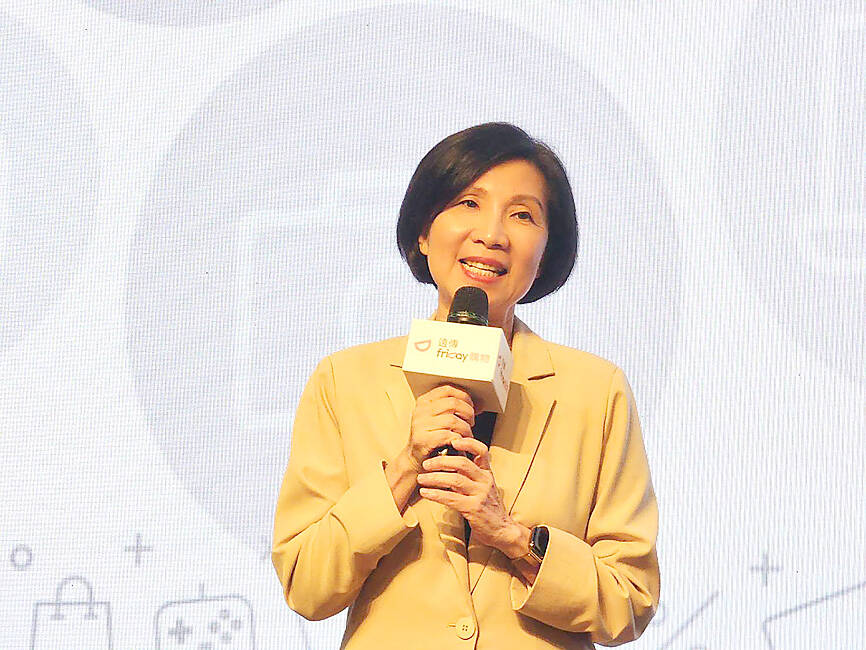Subscribers of Asia-Pacific Telecom’s (APT) telecom services would be given at least one-and-a-half years to fully migrate to Far EasTone Telecommunications’ (FET) networks if the National Communications Commission (NCC) and the Fair Trade Commission (FTC) approve their merger, the telecoms authority yesterday said at its weekly news conference.
The commission yesterday reviewed proposed mergers between FET and APT, and between Taiwan Mobile and Taiwan Star. Far EasTone president Chee Ching (井琪), APT chairman Steven Chen (陳鵬), Taiwan Mobile president Jaime Lin (林之晨) and Taiwan Star president Cliff Lai (賴弦五) were present to answer questions from NCC commissioners.
NCC Chairman Chen Yaw-shyang (陳耀祥), who presided over the meeting, ruled that discussions of the two cases would resume after the telecoms provide supplementary information to the commission within one week.

Photo: CNA
NCC Deputy Chairman and spokesman Wong Po-tsung (翁柏宗) said that commissioners focused on how the telecoms plan to address issues following the mergers — from the integration of telecom service networks to monthly plans for subscribers and job transition plans for employees of APT and Taiwan Star, which would cease to exist after the mergers.
FET said that it would take at least one-and-a-half years to complete the integration of its telecom service networks with those built by APT, while Taiwan Mobile said it would submit a timeline on the network integration in a written report, Wong said.
Integration of telecom service networks takes time, he said, citing similar cases in the EU, Malaysia and Thailand.
Overall, telecom service subscribers should benefit from the mergers, particularly those of APT and Taiwan Star, he said.
“Currently, APT service subscribers can only access the telecom’s 700MHz and 2,600MHz frequency bands. If APT’s merger with FET is approved, subscribers would also be able to access FET’s 1,800MHz, 2,100MHz, 2,600MHz and 3,500MHz bands. With more bandwidth, customers would enjoy better and faster services,” Wong said.
FET and Taiwan Mobile would be held responsible during the transition period if subscribers experience service disruption or other communication issues, NCC Department of Platform and Business deputy director Tsai Kuo-dong (蔡國棟) said.
FET and Taiwan Mobile told the commissioners that they plan to work with mobile virtual network operators to enhance their competitive edge and give consumers more service options, Wong said.
As the two proposed mergers would result in Taiwan Mobile and FET exceeding the legal limits on bandwith ownership, the commission will negotiate with the Ministry of Digital Affairs to resolve the problem, Wong said.
Taiwan Mobile’s proposed merger with Taiwan Star, if approved, would allow the nation’s second-largest telecom to own 60MHz of bandwidth at frequency bands below 1 gigahertz, which would exceed one-third — or 50MHz — of the total auctioned spectrum of 150MHz.
Regulations require telecoms to give any extra bandwidth back to the commission.

Taiwan is stepping up plans to create self-sufficient supply chains for combat drones and increase foreign orders from the US to counter China’s numerical superiority, a defense official said on Saturday. Commenting on condition of anonymity, the official said the nation’s armed forces are in agreement with US Admiral Samuel Paparo’s assessment that Taiwan’s military must be prepared to turn the nation’s waters into a “hellscape” for the Chinese People’s Liberation Army (PLA). Paparo, the commander of the US Indo-Pacific Command, reiterated the concept during a Congressional hearing in Washington on Wednesday. He first coined the term in a security conference last

Prosecutors today declined to say who was questioned regarding alleged forgery on petitions to recall Democratic Progressive Party (DPP) legislators, after Chinese-language media earlier reported that members of the Chinese Nationalist Party (KMT) Youth League were brought in for questioning. The Ministry of Justice Investigation Bureau confirmed that two people had been questioned, but did not disclose any further information about the ongoing investigation. KMT Youth League members Lee Hsiao-liang (李孝亮) and Liu Szu-yin (劉思吟) — who are leading the effort to recall DPP caucus chief executive Rosalia Wu (吳思瑤) and Legislator Wu Pei-yi (吳沛憶) — both posted on Facebook saying: “I

The Ministry of Economic Affairs has fined Taobao NT$1.2 million (US$36,912) for advertisements that exceed its approved business scope, requiring the Chinese e-commerce platform to make corrections in the first half of this year or its license may be revoked. Lawmakers have called for stricter enforcement of Chinese e-commerce platforms and measures to prevent China from laundering its goods through Taiwan in response to US President Donald Trump’s heavy tariffs on China. The Legislative Yuan’s Finance Committee met today to discuss policies to prevent China from dumping goods in Taiwan, inviting government agencies to report. Democratic Progressive Party Legislator Kuo Kuo-wen (郭國文) said

The Ministry of Economic Affairs has fined Taobao NT$1.2 million (US$36,900) for advertisements that exceeded its approved business scope and ordered the Chinese e-commerce platform to make corrections in the first half of this year or its license would be revoked. Lawmakers have called for stricter supervision of Chinese e-commerce platforms and more stringent measures to prevent China from laundering its goods through Taiwan as US President Donald Trump’s administration cracks down on origin laundering. The legislature’s Finance Committee yesterday met to discuss policies to prevent China from dumping goods in Taiwan, inviting government agencies to report on the matter. Democratic Progressive Party